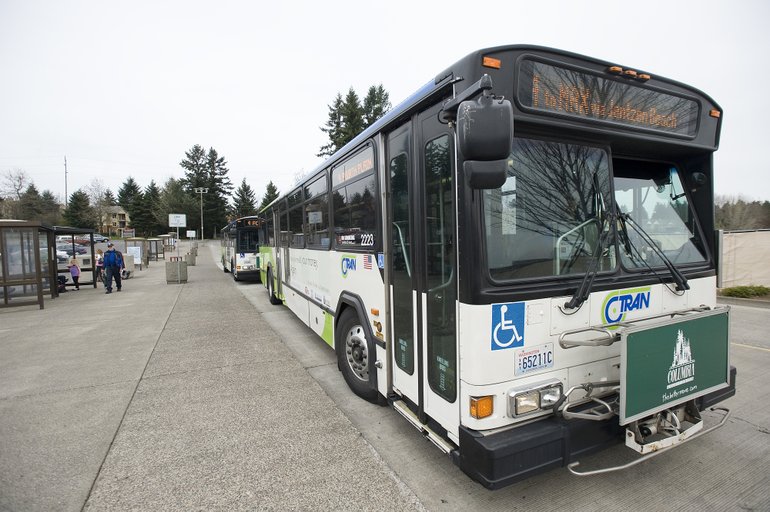The C-Tran board on Tuesday took another step toward asking voters for a sales tax hike this November to help pay for maintaining new high-capacity transit systems.
But in a vote that was anything but routine, board members raised plenty of questions about the state-mandated review process that’s required to get there. And they made it clear they want to keep their options open.
C-Tran leaders have stated their intention to float a public sales tax vote to cover operation costs for proposed light rail and bus rapid transit systems in Vancouver. As part of that process, the state’s High Capacity Transit Act requires an independent “expert review panel” to take a close look at those systems, according to C-Tran.
The board on Tuesday kicked off that process, hiring Vancouver-based consultant BergerABAM to oversee the panel. The contract won’t exceed $330,828, according to C-Tran.
That process must finish by this summer for a high-capacity transit sales tax vote to happen in November. But, some board members expressed doubts over whether that’s a sure thing, whether a non-binding “advisory vote” should happen first — even whether another sales tax increase is necessary at all. Vancouver Mayor Tim Leavitt, one of nine voting C-Tran board members, suggested adding what amounts to an opt-out clause in BergerABAM’s contract, in the event that another funding source for light rail operations becomes available as part of the Columbia River Crossing.
“There are a lot of moving parts,” Leavitt said after the meeting. “Because the two are hitched right now, it adds complexity to the discussion.”
Leavitt said Tuesday he’d support a non-binding public vote either way. That would fulfill a request made recently by Congresswoman Jaime Herrera Beutler, who has called for a vote gauging public support of the CRC. Plans for the more than $3 billion project would bring light rail into downtown Vancouver as part of an Interstate 5 Bridge replacement.
Clark County Commissioner Tom Mielke proposed putting an advisory vote on the November ballot as a sort of place holder, in case the review panel couldn’t finish in time to hold a sales tax vote in 2012. That motion died when no other board member offered a second.
With the contract eventually approved Tuesday, C-Tran Executive Director Jeff Hamm said the expert review panel process is still on track to finish in time for the November election. The review would likely focus more on still-evolving bus-rapid-transit plans — that’s because of extensive work already done on the CRC and its light rail component.
C-Tran officials are hoping it also comes in under the $330,000 budget.
“We’re hoping that this whole amount won’t be expended on this (process),” said public affairs director Scott Patterson.
The board also heard an update on the BRT (bus-rapid-transit) plans themselves, which continue to narrow as planners evaluate possibilities for the city’s Fourth Plain and Fort Vancouver Way corridors.
BRT works by using larger vehicles, raised boarding stations, dedicated lanes and specialized traffic signals to move passengers more smoothly. A system on Fourth Plain wouldn’t use all of those features, but some combination of them.
Two basic BRT options remain on the table for Vancouver: A curb-side station alternative that would put BRT buses in the right lane, and a median alternative that would have buses running in the left lane to serve median stations. Planners are also considering smaller, non-BRT fixes, and a “no-build” option that would essentially leave Fourth Plain and Fort Vancouver Way as is.
The idea of dedicated bus lanes appears dead for Fourth Plain. But that remains a possibility for Fort Vancouver Way near Clark College.
C-Tran hopes to settle on a preferred option in June, project manager Chuck Green said Tuesday. The project could cost as much as $75 million, but the final amount will depend on what’s chosen and could be lower, he said.
Past BRT coverage:




